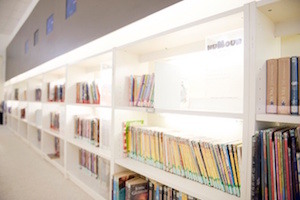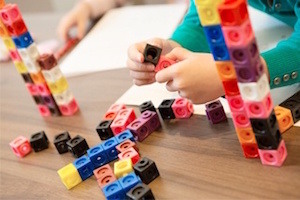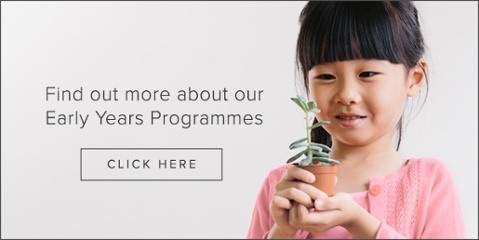
We sat down with Lee Sue Lynn, Academic Director for the Early Years, and Goh Wan Mei, Head of Math Curriculum at The Learning Lab, to get their answers to some burning questions parents commonly have when it comes to preschool enrichment.
Q: Is My Child Too Young For Enrichment Classes?
Sue Lynn (SL): It is never too early to expose your child to the English language. English is the main language of communication and also the main medium for all subjects, so enrichment in this subject will be a good springboard for your child.
Wan Mei (WM): It is good to start early to be well prepared for primary school. The love for Math should be cultivated at a young age. Curiosity towards Math can be encouraged by helping your child draw links between Math concepts and his or her everyday life (e.g. pointing out shapes during a car ride, counting shells at the beach, identifying repeated patterns found on floor tiles etc).
Q: What Are The Benefits Of Starting My Child On Enrichment Early?
WM: Some parents worry about starting their child “too early” or have the misconception that, at this early age, their child should not be stressed with “actual school work” and be enjoying their childhood instead. Nuturing a love of learning lies at the heart of TLL. Ensuring your child enjoys the learning process is of utmost importance to us.
Our Math materials are structured progressively – this provides enough breadth and depth to give your child a headstart in the subject while still ensuring that he or she is able to grasp the concepts covered. Beyond academics, we aim to inject as many fun elements into each lesson as possible by designing interesting in-house games for challenging topics.
SL: Choosing the right centre for your child sets the stage for a lifetime of magical learning moments. A good enrichment centre would spark the innate curiosity that your child has about the world around them. It is really important not to douse the interest in learning at this age, so we make sure our English lessons are fun and enriching to strengthen your child’s grasp on the language and build his or her confidence. Added knowledge about the world around your child makes for very engaging conversations in the car rides home!
Q: Is There An Ideal Way Of Learning English Or Maths For A Pre-Schooler That Can Prepare My Child For School?

SL: The most effective form of learning comes from being able to relate lessons learnt in the classroom to experiences in daily life. When your child is able to form a connection between the words he or she reads on paper to the world he or she lives in, your child will naturally develop a joy and love for learning.
Two of the things our English preschool students most look forward to are the weekly library visits and our interactive storytelling sessions. Here at TLL, we hope to nurture a love for books in your child from a very young age. The TLL Libraries at our centres house a collection of 77,000 books to give your child the opportunity to not only further explore his or her love for books, but also be armed with an extensive range of vocabulary and language skills at the upper levels.
WM: It is really quite exciting to see how our English teachers are able to bring lessons to life thorugh the stories they read to their students. In Math, we consistently link our lessons to real-life scenarios to build a really strong Math foundation for your child.
Instead of rote memorisation, we also bring in hands-on activities, songs, games and stories to help your child learn better.
A strong number sense sets the foundation for higher-level mathematical thinking, so we do our best to give your child opportunities to explore number concepts to allow him or her to fully understand the subject.
Q: Can My Child Really Pick Up Math At Such A Young Age?

WM: Math can be daunting, especially when you associate it with model drawing and topics like Multiplication and Division or when you see students, often in primary school, struggle to understand algebraic concepts.
Don’t worry! Math is not just about solving problem sums. The Math programme for our pre-schoolers is geared towards introducing your child to numbers sense and developing his or her curiosity towards the subject.
We believe that Math is not a stand-alone subject and, for your young child, an integrated approach towards the subject can increase his or her awareness of mathematical concepts. For example, we would encourage you to use Math vocabulary when communicating with your child during activities such as arts and crafts (introducing geometrical shapes), reading (“I wonder how many more pages there are to the end of the story”) and more.
Q: Are There Any Guidelines On What My Child Should Have Already Grasped At The End Of Preschool?
SL: By the end of K2, your child should be able to comprehend simple passages and answer short-answer questions. He or she will also be able to write and speak more confidently. At the same time, your child should also be able to complete basic pre-primary exercises like vocabulary, full sentence construction and reading of short comprehension passages.
WM: For Math, by the end of K2, your child should be comfortable with rote counting and number recognition. At the same time, he or she would have a good mastery of Math concepts such as Addition, Substraction, Multiplication and Division to prepare him or her for Primary 1 Math.
Ever Wondered What Goes On In Our Kindergarten Lessons?
At TLL, we believe in empowering your preschool child to learn, create and achieve through lessons that are directly relevant to his or her learning needs. We want to work together with you to help your child overcome challenges he or she may face.
The Learning Lab is now at locations. Find a location that suits your needs.
If you have any enquiries about our programmes, please email us at enquiry@thelearninglab.com.sg or call us at 6733 8711 and we will be happy to assist you.

